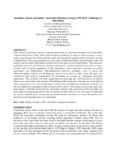Secondary School Agriculture Curriculum Reforms in Kenya 1959-2016: Challenges to Innovations
Abstract
Fifty seven of curriculum reforms targeting innovations to education through school agriculture
remain unattainable to date. Observations indicate challenges to reforms rather progress as there
exists a gap between the desired and the reality, the demand for quality and the relevance of what
is implemented. The target population for the study included individuals and institutions with both
primary and secondary information on innovative strategies on school agriculture. The study used
qualitative research with historical design to purposively sample respondents from 26 secondary
schools with an initial population of 104 respondents where innovative strategies on school
agriculture were implemented. Self-administered interview schedules, visits to school and
education offices archives for documentary sources were used to collect data. The data was
synthesized and analyzed qualitatively by generating an account of curriculum innovative
approaches. This involved selecting, organizing and analyzing the collected data in to topical
themes and central ideas and concepts. The findings of this study shows that the perceived reforms
either stagnated or were reversed leading to a knowledge and skills gap making the consumers of
the curriculum less competitive in the economy of the country. The lessons learnt in this study may
help design worthwhile approaches for curriculum reforms with an increased drive for skills and
knowledge in producing graduates who are destined to the world of work. The paper recommends
the need to establish policy monitoring and implementation machinery to ensure that policies are
interpreted and implemented as recommended.

